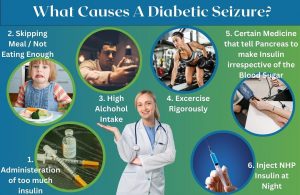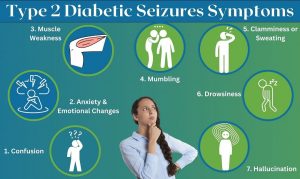Can Type 2 Diabetes Cause Seizures?
Hyperglycemia is in other words, high blood glucose. Although, it’s a common diabetic complication, hyperglycemia might happen to anyone. If left untreated, high blood sugar levels can cause hyperglycemia-related seizures. If you want to know about, can Type 2 Diabetes cause Seizures, read further.
Nearly 25% of diabetics might experience seizures. Often, these happen because of low blood glucose. Instead, if left managed, hyperglycemia can also produce seizures. Read on to know about these seizures and how to avoid them below.
Epilepsy is a neurological issue having only one visible symptom i.e., recurrent convulsions or seizures, the severity of which can vary from person to person. While the diagnosis of epilepsy is done during childhood, it can develop at any age, even in people more than 65 years of age.
It is likely for type 1 or type 2 diabetics together with epilepsy, however, the relationship between epilepsy and diabetes is indistinct.
What Causes A Diabetic Seizure?

Diabetic seizure may occur as an excess of insulin is injected, or as diabetic patient did not consume right after using insulin. Some of the other likely reasons may involve not consuming meals repeatedly or drinking an excess of alcohol.
Even several oral type 2 diabetes medications might make the body produce too much insulin. Irrespective of the reasons behind the seizure, it is always a medical emergency. Learn more about can type 2 diabetes cause seizures in this blog.
Type 2 Diabetic Seizures Symptoms:

Some of the most common signs may involve:
- Drowsiness
- Weakness
- Sweating
- Confusion
- Stickiness
- Hallucinations
- Anxiety
- Shaking
- Rapid and unexpected emotional changes.
Can Type 2 Diabetes Cause Seizures?

Seizures take place when there is too much of electrical activity in neuronal groups present in the brain. Many times, people recover rapidly from seizures, which generally vanish within some minutes.
Yet, persistent seizures can seriously limit one’s standard of living, for instance, individuals can be avoided from driving and some might require regular management.
Seizures that take place as a result of diabetes, in the presence of very low glucose levels, are called non-epileptic seizures. It is expected for people to be both epileptic and diabetic, and this may accompany challenges in detecting whether the convulsions are linked to epilepsy or blood sugar levels. The symptoms of seizures can be similar in diabetes and epilepsy.
So, can type 2 diabetes cause seizures? A lot of studies have established diabetes and its relationship with epilepsy, with much of the research focusing on type 2 diabetes. Type 2 diabetics were 2.84 times more likely to develop epilepsy than non-type 2 diabetic patients.
One theory behind this is that autoimmunity may be involved, while it’s also been thought that too much sugar levels can enhance the likelihood of seizures.
Diabetic Seizure Recovery:

A diabetic coma may influence a diabetic person when they have high or low blood glucose levels or other materials in the body. With quick treatment, a rapid recovery is likely.
It will usually take around 15 minutes to recover from a mild episode of hypoglycaemia. If you have a blood glucose meter, measure your blood sugar again after 15 to 20 minutes.
Yet, without early treatment, it might become fatal or bring about brain damage.
FAQs:
What are diabetic seizure after effects?
When a person has intensely low or high blood sugar levels, he or she can experience severe signs including confusion, shock, loss of consciousness, and seizure. Diabetic seizures might be fatal.
Do diabetics have seizures?
Epilepsy is often noticed in diabetics. And an emerging link between the two conditions is more than spontaneous based on research. Nearly 25% of diabetic patients experience various types of seizures.
What does a diabetic seizure look like?
To identify a diabetic seizure, it is important to look for signs like unconsciousness, confusion, muscle weakness, or overwhelming body movements.
What to do if someone has a diabetic seizure?
The first aid required for person having a diabetic emergency is by giving them something sweet to consume or a non-diet drink. Also, one can comfort the person. Many individuals would slowly improve, but if in doubt, call 999.
Can diabetic seizures cause brain damage?
Too much low blood glucose levels may result in diabetic seizure, which may also cause brain damage. So, this blog gives a clear understanding on can type 2 diabetes cause seizures.

